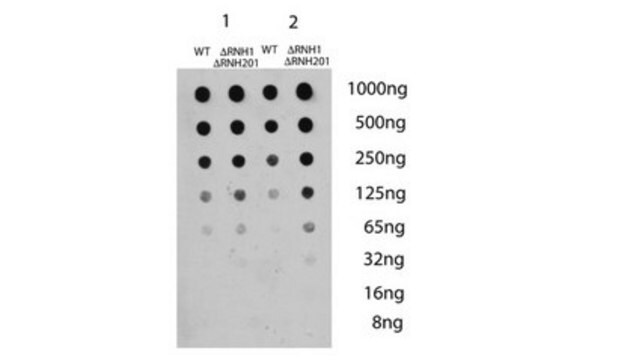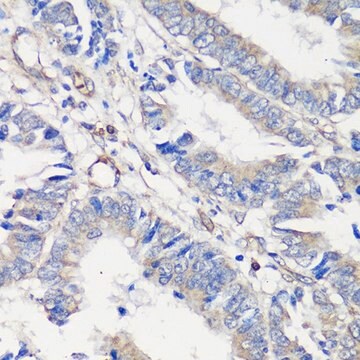ADD620C
HepaRG™ Maintenance and Metabolism Medium Supplement with Antibiotics
Autenticatiper visualizzare i prezzi riservati alla tua organizzazione & contrattuali
About This Item
Codice UNSPSC:
12352207
NACRES:
NA.71
Prodotti consigliati
Forma fisica
liquid
Condizioni di spedizione
dry ice
Temperatura di conservazione
−20°C
Descrizione generale
Biopredic′s HepaRG Maintenance and Metabolism Medium Supplement with Antibiotics can be used with all HepaRG cell lines. See user guide for detailed protocols.
HepaRG™ cells uniquely maintain significant levels of hepatic cell functions, being CYP450 inducible and support the complete hepatitis B virus (HBV) replicative cycle.
Applicazioni
HepaRG™ maintenance and metabolism medium supplement with antibiotics has been used to culture HepaRG cells:
- to study the interaction of hepatocytes and cholangiocytes when challenged with chlorpromazine (CPZ)
- to assess the validity of stable reference genes (RG) for gene expression using quantitative real-time polymerase chain reaction (RT-qPCR)
- as a supplement in basal hepatic cell culture medium to study the effects of cholestasis on liver connexins
Note legali
Use of this product is subject to one or more license agreements.
HepaRG cells are patented and their use is strictly limited; consider the cells as a single use, disposable product that must be destroyed upon conclusion of a study or experiment. Propagating, reproducing, cloning, subcloning or any other use of the cells following the conclusion of a study is prohibited. Use of the cells to produce or manufacture commercial products for general sale or for use in the manufacture of products intended for general sale is prohibited. Transfer of the cells to anyone not employed within the same organization, whether for financial benefit or not, is prohibited. If you are unwilling to accept the terms of this LIMITED USE LICENSE, do not ORDER or use them and immediately return the cells for credit. Violators of this Limited Use Licesense will be prosecuted to the fullest extent of the law.
HepaRG cells are patented and their use is strictly limited; consider the cells as a single use, disposable product that must be destroyed upon conclusion of a study or experiment. Propagating, reproducing, cloning, subcloning or any other use of the cells following the conclusion of a study is prohibited. Use of the cells to produce or manufacture commercial products for general sale or for use in the manufacture of products intended for general sale is prohibited. Transfer of the cells to anyone not employed within the same organization, whether for financial benefit or not, is prohibited. If you are unwilling to accept the terms of this LIMITED USE LICENSE, do not ORDER or use them and immediately return the cells for credit. Violators of this Limited Use Licesense will be prosecuted to the fullest extent of the law.
HepaRG is a trademark of BioPredic International company
Avvertenze
Warning
Indicazioni di pericolo
Consigli di prudenza
Classi di pericolo
Repr. 2
Codice della classe di stoccaggio
10 - Combustible liquids
Classe di pericolosità dell'acqua (WGK)
WGK 3
Punto d’infiammabilità (°F)
Not applicable
Punto d’infiammabilità (°C)
Not applicable
Certificati d'analisi (COA)
Cerca il Certificati d'analisi (COA) digitando il numero di lotto/batch corrispondente. I numeri di lotto o di batch sono stampati sull'etichetta dei prodotti dopo la parola ‘Lotto’ o ‘Batch’.
Possiedi già questo prodotto?
I documenti relativi ai prodotti acquistati recentemente sono disponibili nell’Archivio dei documenti.
Beth Williamson et al.
Pharmacology research & perspectives, 4(5), e00264-e00264 (2016-10-08)
The nuclear pregnane X receptor (PXR) regulates the expression of genes involved in the metabolism, hepatobiliary disposition, and toxicity of drugs and endogenous compounds. PXR is a promiscuous nuclear hormone receptor (NHR) with significant ligand and DNA-binding crosstalk with the
Catherine C Bell et al.
Drug metabolism and disposition: the biological fate of chemicals, 45(4), 419-429 (2017-02-01)
Reliable and versatile hepatic in vitro systems for the prediction of drug pharmacokinetics and toxicity are essential constituents of preclinical safety assessment pipelines for new medicines. Here, we compared three emerging cell systems-hepatocytes derived from induced pluripotent stem cells, HepaRG
Anika Mann et al.
Human cell, 30(4), 267-278 (2017-05-21)
HepaRG cells are widely used as an in vitro model to assess drug-induced hepatotoxicity. However, only few studies exist so far regarding their suitability to detect the effects of drugs requiring a preceding activation via the cytochrome P450 (CYP) system.
Yi Ni et al.
Methods in molecular biology (Clifton, N.J.), 1540, 15-25 (2016-12-16)
Investigations of virus-host interactions rely on suitable in vitro cell culture systems that efficiently support virus infection. Such systems should ideally provide conditions that resemble those of natural host cells, e.g., the cell-type specific signaling and metabolic pathways. For HBV
Maxime Demazeau et al.
International journal of pharmaceutics, 524(1-2), 268-278 (2017-04-04)
In this study, we evaluated cationic liposomes prepared from diether-NH
Il team dei nostri ricercatori vanta grande esperienza in tutte le aree della ricerca quali Life Science, scienza dei materiali, sintesi chimica, cromatografia, discipline analitiche, ecc..
Contatta l'Assistenza Tecnica.



